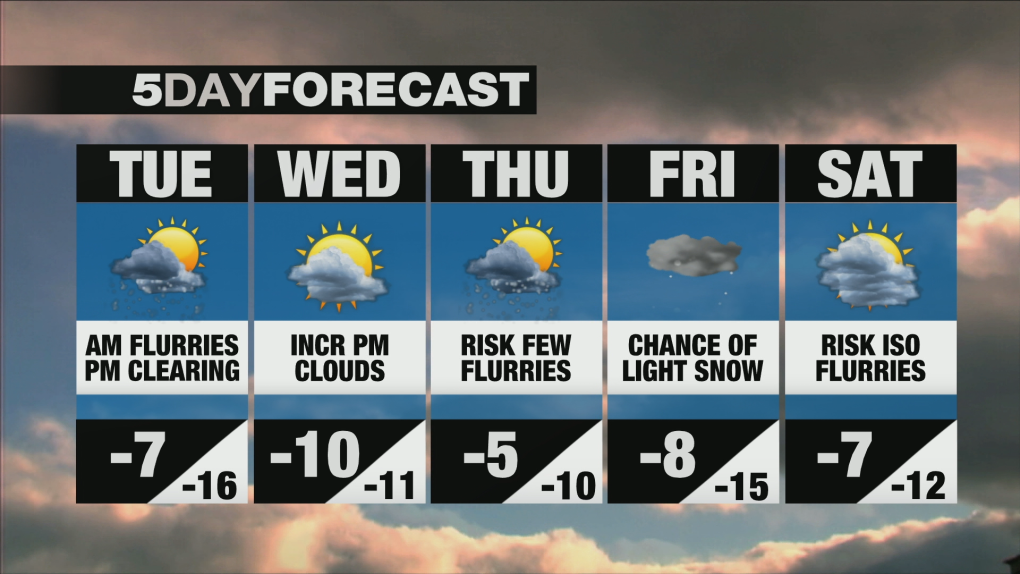Temperatures in Toronto could feel like -25 C tonight; Pearson Airport warns of possible disruptions
Toronto Pearson International Airport is warning of possible flight disruptions as the city braces for overnight temperatures set to feel like -25 C.
In a statement released Tuesday afternoon, the airport said that weather systems across Canada may impact flights at Toronto Pearson and urged travellers to check their flight status before they depart.
- Download our app to get local alerts on your device
- Get the latest local updates right to your inbox
The advice comes ahead of what is expected to be a “bitterly cold” night in Toronto, according to CP24 meteorologist Bill Coulter. “Not only this afternoon, when it's gonna feel around -14 C, -15 C at its warmest, but overnight tonight.”
According to Environment Canada, a low of -16 C is forecasted in Toronto, but the wind chill could make it feel like -25 C.
 Bill Coulter gives the 7-day weather forecast on CP24 Tuesday. January 16. (CP24)
Bill Coulter gives the 7-day weather forecast on CP24 Tuesday. January 16. (CP24)
In preparation for the cold, Toronto’s Cecil Street warming centre, which only opens when the temperature drops below - 15 C, will open its door at 5 p.m. on Tuesday. It will join the four centres already accepting walk-ins, at 136 Spadina Rd., 75 Elizabeth St., 12 Holmes Ave., and 885 Scarborough Golf Club Rd.
While residents awoke to flurries Tuesday morning, the city says no more than two centimetres of accumulation is expected. In light of the snow, the city is advising residents to keep a safe distance from snow-clearing equipment and to slow down while on the roads or consider taking public transit.
While the morning may have brought messy conditions, the sun is expected to make an appearance in Toronto by Tuesday afternoon, Coulter predicts. That doesn’t mean an end to the cold, however – temperatures in Toronto are forecasted to remain below -5 C into the weekend, with snow once again in the forecast around Friday.
An extreme cold warning is in effect in Caledon, Halton Hills and Milton, with wind chill values near -30 is expected this evening into Wednesday morning.
"Extreme cold warnings are issued when very cold temperatures or wind chill creates an elevated risk to health such as frost bite and hypothermia," Environment Canada said.
CTVNews.ca Top Stories

DEVELOPING Driver rams New Year's revellers in New Orleans, killing 10. FBI investigating as 'act of terrorism'
A vehicle raced into a crowd of New Orleans revellers early on New Year's Day, killing 10 people and injuring 30 others in what the FBI is investigating as an act of terrorism.
Financial changes in Canada you should know about this year
There are a few changes in federal policies that could affect Canadians' finances in the new year.
A single cigarette slashes 20 minutes off your life expectancy, U.K. research suggests
If you're thinking about making a New Year's resolution to quit smoking, it might help to know that new research says it could extend your life expectancy.
Ukraine halts transit of Russian gas to Europe after a prewar deal expired
Ukraine on Wednesday halted Russian gas supplies to European customers that pass through the country, almost three years into Moscow's all-out invasion of its neighbor, after a prewar transit deal expired at the end of last year.
Here are some of the new laws and rules coming into effect in Canada in 2025
From boosting child and disability benefits to increasing protections for workers, here’s a look at new measures coming into effect in 2025.
'It Ends With Us' director Justin Baldoni sues New York Times for libel over Blake Lively story
'It Ends With Us' director Justin Baldoni sued The New York Times for libel on Tuesday over its story on allegations that he sexually harassed and sought to smear the reputation of the film's star, Blake Lively.
From a mini fridge to a toy doll, here's what has been lost on public transit in Ontario this year
Most people understand the pain that comes with leaving a phone, wallet or umbrella behind on-board public transit and the despair of whether or not it'll ever be found again. Well, outside of those commonly forgotten valuables, items like a porcelain doll, Mac DeMarco vinyl record, mini-fridge, or a toaster oven with food still inside have also been left behind on public transit this year.
Here's your 2025 guide to the night sky and other celestial wow moments
The new year will bring a pair of lunar eclipses, but don't expect any sun-disappearing acts like the one that mesmerized North America last spring.
The woman who was burned to death inside a New York City subway has been identified
The woman who died after being set on fire in a New York subway train earlier this month was a 57-year-old from New Jersey, New York City police announced Tuesday.






























